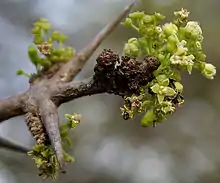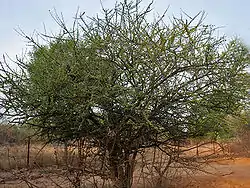Canthium
Canthium is a genus of flowering plants in the family Rubiaceae. They are shrubs and small trees. The leaves are deciduous and the stems are usually thorny.
| Canthium | |
|---|---|
 | |
| Canthium coromandelicum | |
| Scientific classification | |
| Kingdom: | Plantae |
| Clade: | Tracheophytes |
| Clade: | Angiosperms |
| Clade: | Eudicots |
| Clade: | Asterids |
| Order: | Gentianales |
| Family: | Rubiaceae |
| Subfamily: | Ixoroideae |
| Tribe: | Vanguerieae |
| Genus: | Canthium Lam. |
| Type species | |
| Canthium coromandelicum | |
| Synonyms | |
Distribution
Canthium species are predominantly found in Southeast Asia, especially in Thailand and the Philippines.[1] A small number of species is found in India, Sri Lanka, and Bangladesh. Only a limited number of species is found on the African continent, especially in Southern and East Africa.[2]
Taxonomy
Canthium was named by Jean-Baptiste Lamarck in 1785 in Encyclopédie Méthodique.[3] The name is a latinisation of "kantankara", a Malayalam name from Kerala for Canthium coromandelicum. Kantan means "shining" and kara means "a spiny shrub".[4] The biological type for the genus consists of specimens originally described by Jean-Baptiste Lamarck as Canthium parviflorum[5] but this species is now included in Canthium coromandelicum.[1] Canthium is a member of Vanguerieae, a tribe that is monophyletic and easily recognized morphologically, but in which generic boundaries were, for a long time, very unclear.[6] Canthium was especially problematic, and until the 1980s, it was defined broadly and known to be polyphyletic. Psydrax was separated from it in 1985,[7] as was Keetia in 1986.[8] These were followed by Pyrostria and Multidentia in 1987.[9][10] The subgenus Afrocanthium was raised to generic rank in 2004,[11] followed by Bullockia in 2009.[12] A few species were transferred to Canthium from Rytigynia and other genera in 2004.[11] The genus was further reduced by the transfer of species to Peponidium and Pyrostria.[13] In 2016, two Canthium species endemic to the Philippines were transferred to a genus of their own, Kanapia.[14] The final circumscription of Canthium will remain in doubt until phylogenetic studies achieve greater resolution for the clade containing Canthium coromandelicum and its closest relatives.
Species
- Canthium aciculatum Ridl.
- Canthium angustifolium Roxb.
- Canthium approximatum Korth.
- Canthium arboreum Vidal
- Canthium aurantiacum Merr. & L.M.Perry
- Canthium berberidifolium Geddes
- Canthium bipinnatum (Blanco) Merr.
- Canthium brunneum (Merr.) Merr.
- Canthium calvum Craib
- Canthium cambodianum Pit.
- Canthium campanulatum Thwaites
- Canthium cavaleriei H.Lév.
- Canthium ciliatum (D.Dietr.) Kuntze
- Canthium coffeoides Pierre ex Pit.
- Canthium confertum Korth.
- Canthium congestiflorum Ridl.
- Canthium cordatum Dillwyn
- Canthium coromandelicum (Brum.f.) Alston
- Canthium culionense (Elmer) Merr.
- Canthium depressinerve Ridl.
- Canthium ellipticum (Merr.) Merr.
- Canthium elmeri Merr.
- Canthium fenicis (Merr.) Merr.
- Canthium ferrugineum Craib
- Canthium filipendulum Pierre ex Pit.
- Canthium fraternum Miq.
- Canthium glandulosum (Blanco) Merr.
- Canthium glaucum Hiern
- Canthium gracilipes Kurz
- Canthium hainanense (Merr.) Lantz
- Canthium hirtellum Ridl.
- Canthium hispidonervosum (De Wild.) C.M.Evrard
- Canthium horridulum Craib
- Canthium horridum Blume
- Canthium inerme (L.f.) Kuntze
- Canthium korthalsianum Miq.
- Canthium kuntzeanum Bridson
- Canthium laeve Teijsm. & Binn.
- Canthium lasianthoides Miq.
- Canthium leytense (Merr.) Merr.
- Canthium libericum Dinkl.
- Canthium longipes Geddes
- Canthium lucidum R.Br.
- Canthium macrocarpum Thwaites
- Canthium megacarpum (Merr.) Merr.
- Canthium megistocarpum Merr. & L.M.Perry
- Canthium merrillianum Mabb.
- Canthium merrillii (Setch.) Christoph.
- Canthium mite Bartl. ex DC.
- Canthium molle King & Gamble
- Canthium moluccanum Roxb.
- Canthium neilgherrense Wight
- Canthium oblongifolium Quisumb. & Merr.
- Canthium oblongum (Valeton) Kaneh.
- Canthium oliganthum (Miq.) Boerl.
- Canthium oligocarpum Hiern
- Canthium parvifolium Roxb.
- Canthium paucinervium (Merr.) Merr.
- Canthium pedunculare Cav.
- Canthium perakanthus ined.
- Canthium polyanthum Miq.
- Canthium puberulum Thwaites ex Hook.f.
- Canthium quadratum Craib
- Canthium rheedei DC.
- Canthium sarcocarpum (Merr.) Merr.
- Canthium sarmentosum Craib
- Canthium scabridum Ridl.
- Canthium scandens Blume
- Canthium schlechterianum Merr. & L.M.Perry
- Canthium siamense (Harms) Pit.
- Canthium simile Merr. & Chun
- Canthium sordidum (K.Schum.) Bullock
- Canthium spinosum (Klotzsch ex Eckl. & Zeyh.) Kuntze
- Canthium spirostylum Miq.
- Canthium stellulatum Craib
- Canthium strigosum Craib
- Canthium strychnoides Craib
- Canthium subaureum Craib
- Canthium subcapitatum (Merr.) Merr.
- Canthium suberosum Codd
- Canthium subsessilifolium (Merr.) Merr.
- Canthium sumatranum Miq.
- Canthium tavoyanum (R.Parker) Merr.
- Canthium travancoricum Bedd.
- Canthium trichophorum Quisumb. & Merr.
- Canthium umbelligerum Miq.
- Canthium vanwykii Tilney & Kok
- Canthium villarii Vidal
- Canthium violaceum Zoll. & Moritzi
References
| Wikimedia Commons has media related to Canthium. |
- Bridson DM (1992). "The genus Canthium (Rubiaceae - Vanguerieae) in tropical Africa". Kew Bulletin. 47 (3): 353–401. doi:10.2307/4110569. JSTOR 4110569.
- "Canthium in the World Checklist of Rubiaceae". Retrieved 8 November 2016.
- Lamarck J-B (1785). Encyclopédie méthodique par ordre des matières. 1. p. 602.
- Quattrocchi U (2000). CRC World Dictionary of Plant Names. 1. Boca Raton, New York, Washington DC, London: CRC Press. ISBN 978-0-8493-2675-2.
- Canthium In: Index Nominum Genericorum. In: Regnum Vegetabile
- Lantz H, Bremer B (2005). "Phylogeny of the complex Vanguerieae (Rubiaceae) genera Fadogia, Rytigynia, and Vangueria with close relatives and a new circumscription of Vangueria". Plant Systematics and Evolution. 253 (1–4): 159–183. doi:10.1007/s00606-005-0313-9. S2CID 30867982.
- Bridson DM (1985). "The reinstatement of Psydrax (Rubiaceae, subfam. Cinchonoideae tribe Vanguerieae) and a revision of the African species". Kew Bulletin. 40 (4): 687–725. doi:10.2307/4109853. JSTOR 4109853.
- Bridson DM (1986). "The reinstatement of the African genus Keetia (Rubiaceae subfam. Cinchonoideae tribe Vanguerieae)". Kew Bulletin. 41 (4): 965–994. doi:10.2307/4102996. JSTOR 4102996.
- Bridson DM (1987). "Studies in African Rubiaceae - Vanguerieae: a new circumscription of Pyrostria and a new subgenus, Canthium subgen. Bullockia". Kew Bulletin. 47 (3): 611–639. doi:10.2307/4110068. JSTOR 4110068.
- Bridson DM (1987). "The recognition and recircumscription of the African genus Multidentia (Rubiaceae - Vanguerieae)". Kew Bulletin. 47 (3): 641–654. doi:10.2307/4110069. JSTOR 4110069.
- Lantz H, Bremer B (2004). "Phylogeny inferred from morphology and DNA data: characterizing well-supported groups in Vanguerieae (Rubiaceae)". Botanical Journal of the Linnean Society. 146 (3): 257–283. doi:10.1111/j.1095-8339.2004.00338.x.
- Razafimandimbison SG, Lantz H, Mouly A, Bremer B (2009). "Evolutionary trends, major lineages, and new generic limits in the dioecious group of the tribe Vanguerieae (Rubiaceae): insights into the evolution of functional dioecy". Annals of the Missouri Botanical Garden. 96 (1): 161–181. doi:10.3417/2006191. S2CID 86065468.
- Kainulainen K, Razafimandimbison SG (2016). "New taxonomic combinations in West Indian Ocean Vanguerieae (Rubiaceae)". Phytotaxa. 282 (4): 267–272. doi:10.11646/phytotaxa.282.4.3.
- Arriola AH, Paraguison LD, Alejandro GJ (2016). "Kanapia (Vanguerieae): a new endemic genus of Philippine Rubiaceae". Plant Systematics and Evolution. 302 (7): 911–920. doi:10.1007/s00606-016-1307-5. S2CID 14815565.

